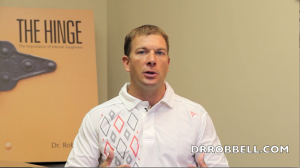Rob Bell's Blog, page 31
October 10, 2014
The Importance of Models for Mental Toughness.
One shot is the reason why the LPGA is currently dominated by Korean golfers. The Hinge moment was by Se RI Pak during the 1998 U.S. Open and she became a model for others, namely Korean girls.
Click on the picture for the video…
October 3, 2014
What confidence doesn’t do!
How many of us have been driving in an unfamiliar place, following our GPS, and we suddenly sensed that we were not quite in the right spot? So, we turned at corner or drove straight ahead disregarding the map. (I sometimes believe that the GPS takes me past businesses so I’ll have to stop.)
We all have a built-in GPS system. It’s called confidence! The belief that our needs will be met, and the ability to trust in our decisions, and those closest to us.
Trust is our gut, our intuition. It’s another reason why confidence is just a feeling.
The GPS just points us in the direction we are supposed to go. It’s our decision whether or not to trust our gut. Even though, if we don’t trust it, we will often be incorrect.
To date, I’ve never had the GPS ask me “How did you get here?” “Why are you in this part of town?” “Are you going to be late?”
Confidence doesn’t judge! It never asks questions like “how did you get in this situation”? This should be over, “why are you even here”? “Are you really good enough”?
Confidence is the ability to re-focus, to let go of mistakes, and to listen to our gut, our inborn GPS. Confident people can do THIS skill.
Click here to subscribe to my Friday Mental Toughness newsletter…

 Dr. Rob Bell is a Sport Psychology coach. DRB & Associates based in Indianapolis works with professional athletes & corporate athletes, coaches, and teams building their Mental Toughness. His 2nd book is titled
The Hinge: The Importance of Mental Toughness
. Follow on twitter
@drrobbell
or contact
drrobbell@drrobbell.com
Dr. Rob Bell is a Sport Psychology coach. DRB & Associates based in Indianapolis works with professional athletes & corporate athletes, coaches, and teams building their Mental Toughness. His 2nd book is titled
The Hinge: The Importance of Mental Toughness
. Follow on twitter
@drrobbell
or contact
drrobbell@drrobbell.com
September 26, 2014
Stay in Touch with The PAIN…
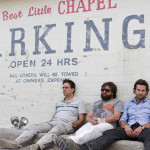
“The Hangover,” distributed by Warner Bros. Pictures.
I once fell off an 80-foot cliff and lay at the bottom until the EMS unit craned me out. I had a broken wrist, my head was gashed open, and my lower back was in an extreme amount of pain. I had to take a daily regiment of Hydrocodone and still could only make it through half the day.
At another low point, I was in a car accident and struck the windshield so hard that it broke my jaw and my collarbone. They had to wire my jaw and 8 weeks later removed the wires from my mouth. It felt like razor blades slicing through my gums.
As a sophomore in high school, I was the starting second baseman and made an error to lose a game. I felt like such a loser that my head was in my hands the entire bus ride home. I ended up losing my starting position.
As a caddy, I even dropped a golf ball during a professional event and cost my player two shots during the tournament!
These four instances surfaced as either physical or mental pain. However, no physical pain is without mental pain. In all of these, I had messed up, and although the physical pain soon passed, what remained were the beliefs and feelings about myself. The residue of not feeling good enough weighed more heavily than any trophy.
If you have broken a bone or failed, then you understand how bad it hurt at the moment. However, the most interesting part about pain is that it fades… that pain becomes generalized. One cannot go back and recreate just how bad or painful it precisely was, we just remember that it hurt. That is why they say, “time heals…”
Now, time does not heal completely. Pain leaves scars. But, we have a choice in how we move forward; we can choose either the pain of discipline or the pain of regret.
Hold onto that pain. Yes, we must move on, but try to never forget that pain completely. Addicts call this remembering their rock bottom! Mental Toughness means being able to stay in touch with the pain and still not be consumed by it. Pain can help us with our gratitude, because we realize we are no longer in that state. It also assists with our focus and motivation. We are now driven toward another goal and way of being.
Click here to subscribe to my Friday Mental Toughness newsletter…

 Dr. Rob Bell is a Sport Psychology coach. DRB & Associates based in Indianapolis works with professional athletes & corporate athletes, coaches, and teams building their Mental Toughness. His 2nd book is titled
The Hinge: The Importance of Mental Toughness
. Follow on twitter
@drrobbell
or contact
drrobbell@drrobbell.com
Dr. Rob Bell is a Sport Psychology coach. DRB & Associates based in Indianapolis works with professional athletes & corporate athletes, coaches, and teams building their Mental Toughness. His 2nd book is titled
The Hinge: The Importance of Mental Toughness
. Follow on twitter
@drrobbell
or contact
drrobbell@drrobbell.com
September 18, 2014
Did I WIN this medal?
Kenya’s long-distance runner & two-time Olympic Champion, Kip Keino uttered these words so athletes would consider performance enhancing drugs. “When you stand on the podium, you must ask yourself, did I win this medal?”
I heard Hall of Fame coach, Joe Gibbs, speak recently. (He is in both the NFL and Nascar Hall of Fame.) He told stories and talked about his faith and gave everyone a copy of his new book, Game Plan for Life.
He had his 1st Superbowl ring with him and announced that everyone could put on the ring and take their picture with him. I was about 10th in line and sure enough, everyone was putting on the illustrious ring and posing with coach.
When I shook his hand, I told him I grew up in Maryland and was a life-long Redskins fan. He proceeded to give me the ring and ask if I wanted my picture with it.
I told him, “Coach, I know what that ring represents and I didn’t earn it, I can’t put it on.” Joe Gibbs, said “ I appreciate that or respect that” and I had my picture with him while the ring lay on the table. 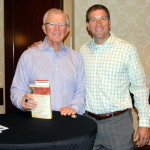
Anything worth getting in life, we have to work for. Last time I checked, they don’t give championships, scholarships, high-paying jobs, or Super Bowl rings away!
Maybe that is the issue with motivation in general? We are given too much, feel we deserve it, and don’t really appreciate it. Or worse, we expect it to be easy to earn.
Click here to subscribe to my Friday Mental Toughness newsletter…

 Dr. Rob Bell is a Sport Psychology coach. DRB & Associates based in Indianapolis works with professional athletes & corporate athletes, coaches, and teams building their Mental Toughness. His 2nd book is titled
The Hinge: The Importance of Mental Toughness
. Follow on twitter
@drrobbell
or contact
drrobbell@drrobbell.com
Dr. Rob Bell is a Sport Psychology coach. DRB & Associates based in Indianapolis works with professional athletes & corporate athletes, coaches, and teams building their Mental Toughness. His 2nd book is titled
The Hinge: The Importance of Mental Toughness
. Follow on twitter
@drrobbell
or contact
drrobbell@drrobbell.com
September 4, 2014
Can We Hate Ourselves to Success?
The answer is Yes!
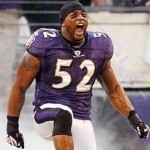 It works! And it is powerful! Although I don’t have research to support this notion, it’s probably the strongest motivator of all… Many successful people were driven and consumed by this over-arching motivation to prove others wrong!
It works! And it is powerful! Although I don’t have research to support this notion, it’s probably the strongest motivator of all… Many successful people were driven and consumed by this over-arching motivation to prove others wrong!
The hatred manifests itself with a belief that “I’m not good enough,” or ”It’s never good enough.” All perfectionists have this mentality. Future Hall of Fame linebacker, Ray Lewis, was driven by bitterness because his father was never around. As a kid, he would do push-ups and sit-ups until he passed out, as a way to deal with the pain.
This mentality of “never being good enough” and hatred is driven by a rage and burning desire to be successful, no matter what. Work Harder! Strive Harder!
It works, but this driver can also easily turn upon itself and become directed inward. It ends up like a torpedo shot from a submarine, which starts looking for any target. Anger directed inward becomes depression.
Unfortunately, this hatred is toxic and it will never lead to happiness. The motivation behind the striving and achieving is skewed. The unquenchable desire for success is that we just don’t like ourselves and we are not good enough. Our belief is that the only way we can become good enough is through our achievement. Life teaches us that we are actually going to lose more than we are ever going to win, and when we win, it’s not for very long.
Even the best athletes at the pinnacle of their success, winning a super bowl, Masters, or US Open can feel lacking…Bernhard Langer after winning the 1985 Masters stated, “I had just won the Masters, I’m driving to Hilton Head with my beautiful young wife, and I felt empty.”
Now, not many will admit that they don’t like themselves. It requires too much rigorous honesty.
The alternative is more difficult and actually requires more work, because we have hated ourselves for not being good enough our entire life. It’s all we know!
The only way to stop hating ourselves is to not judge ourselves. We are often the hanging judge over ourselves and after mistakes and setbacks would pass sentence, “off with our head.” I mean we would never talk to our loved one’s the way we would actually talk to ourselves.
The solution is the realization that we are good enough, we are sanctified, and we are righteous. We then begin to operate from a different set of beliefs. It doesn’t mean the striving ends, but the motivation now stems from a different place and one where we can make a lasting impact and one of significance.
Which mentality are you?
Click here to subscribe to my Friday Mental Toughness newsletter…

 Dr. Rob Bell is a Sport Psychology coach. DRB & Associates based in Indianapolis works with professional athletes & corporate athletes, coaches, and teams building their Mental Toughness. His 2nd book is titled
The Hinge: The Importance of Mental Toughness
. Follow on twitter
@drrobbell
or contact
drrobbell@drrobbell.com
Dr. Rob Bell is a Sport Psychology coach. DRB & Associates based in Indianapolis works with professional athletes & corporate athletes, coaches, and teams building their Mental Toughness. His 2nd book is titled
The Hinge: The Importance of Mental Toughness
. Follow on twitter
@drrobbell
or contact
drrobbell@drrobbell.com
August 28, 2014
My worst mistake as a Sport Psychology coach #Fail
I’ve been in the applied field of Sport Psychology for 10 years, 3+ years entirely as a full-time professional, leaving academia to pursue my passion and start my own business.
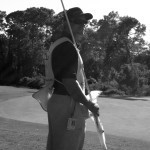
Dr. Rob Bell caddying PGA Tour
My major types of clients are professional golfers, and I have caddied on tour since 2006. Caddying was a natural fit because it was a way to morph into an “on the field” coach during actual competition; no better feeling in my opinion.
In 2012, I am caddying for my client during the last PGA Tour event of the year. He is playing well, 1st place after the first round, and although he moved back a bit during the other rounds, he still had a chance to post a top-10 finish.
Fifteen minutes before each round, we always had a coach-up session, where we devised our mental and course game plan. Every day we had the same simple mental game plan because simple is powerful and simple works. Thus, before the last round, he approached me and I laid it out for him (hence the big mistake).
In the past I have used the following game plan and mentality, and it has been successful, so I wasn’t freewheeling at all. However, there is a lot of intuition with coaching and sometimes coaxing. So, when he asked, “what’s our game plan,” I replied with, “It’s your day.”
He walked away immediately shaking his head in disapproval and mentioned how he didn’t really like it and asked if I had anything else? So, ten minutes before tee-time, I tried to justify, defend, and explain my mantra…. What else am I going to say at that point, “It’s NOT your day?” I said it, believing that good things were going to happen and staying with our process that had worked.
He teed off and proceeded to hit the ball in a hazard, took a drop, hit it in the middle of the green, and 3-putted for a double bogey. Walking on to the 2nd tee, he mentioned to me “yep, it’s my day all right.”
Only after a delay in the middle of the fourth fairway, did we have a chance to backtrack and re-focus. He played solid the rest of the day, but in a sport with large purses and where every shot counts, the damage had been done.
It’s Your Day!
The mistake was that I “got in the way” of my athlete. Perhaps, I inadvertently put the focus on factors outside of his control, believing that it was going to be a good day and that good things were going to happen. I also couldn’t account for the fact that he had heard this phrase a long time ago and played horribly.
Nonetheless, I made a mistake. Less is (almost) always more and I broke it. I tried to get creative and go off menu with my coaching style at the moment. It’s still a fault of mine; there are many tools in the shed and I want to use them all, when just one would do. It takes a genius to keep it simple.
Lastly, it was a costly mistake and if we are in a field of coaching and helping people, we are going to make mistakes. It is one true system of really discovering what methods work and what doesn’t in applied settings.
Click here to subscribe to my Friday Mental Toughness newsletter…

 Dr. Rob Bell is a Sport Psychology coach. DRB & Associates based in Indianapolis works with professional athletes & corporate athletes, coaches, and teams building their Mental Toughness. His 2nd book is titled
The Hinge: The Importance of Mental Toughness
. Follow on twitter
@drrobbell
or contact
drrobbell@drrobbell.com
Dr. Rob Bell is a Sport Psychology coach. DRB & Associates based in Indianapolis works with professional athletes & corporate athletes, coaches, and teams building their Mental Toughness. His 2nd book is titled
The Hinge: The Importance of Mental Toughness
. Follow on twitter
@drrobbell
or contact
drrobbell@drrobbell.com
August 8, 2014
Confident people can do this skill…
Last week, during one round of golf, I actually 3-putted four times….Yeah, brutal. Only after analyzing and anguishing over what happened, I realized something. I never made an adjustment.
Rory McIIory heading into the PGA Championship as the favorite had won back-to-back tournaments, The Open Championship and The Bridgestone Invitational. However at The Memorial in June, he shot a 1st round 63 and followed it with a 78. At The Scottish Open in July, he carded a 1st round 64 and again shot 78 in the 2nd round. What made Rory successful later on was that he made an adjustment…
Confidence lies in the ability to make adjustments. In the classroom, boardroom, or field of play. Those that can make adjustments will be successful. Stubborn people on the other hand make no adjustments (insert definition of insanity here) and sometimes refuse to do.
Adjustments can be physical or mental. It may be a change in attitude or to our routine. Most importantly, however, these adjustments are usually small. Our foundation is solid and all we need to do is make small changes. But it may require asking outside people for their help.
Confident people can make these adjustments because they believe an alteration will make them successful. On the other hand, those that struggle are firmly planted in the belief that a change won’t work.
A boat is off-course 99% of the time. The only way for a boat to reach its destination is to be continually tacking…The best view tacking as The Way to sail, while the stubborn view tacking as stress.
Mental Toughness is being able to deal with the struggle, setbacks, and adversity. How we make adjustments will determine our success.

 Dr. Rob Bell is a Sport Psychology coach. DRB & Associates based in Indianapolis works with professional athletes & corporate athletes, coaches, and teams building their Mental Toughness. His 2nd book is titled
The Hinge: The Importance of Mental Toughness
. Follow on twitter
@drrobbell
or contact
drrobbell@drrobbell.com
Dr. Rob Bell is a Sport Psychology coach. DRB & Associates based in Indianapolis works with professional athletes & corporate athletes, coaches, and teams building their Mental Toughness. His 2nd book is titled
The Hinge: The Importance of Mental Toughness
. Follow on twitter
@drrobbell
or contact
drrobbell@drrobbell.com
August 1, 2014
ONE way to be confident…
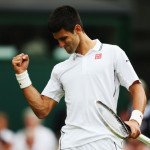
(Photo by Steve Bardens/Getty Images)
Everyone faces adversity, encounters struggle, and goes through dry spells. Mental toughness is how we handle, deal, and cope with these setbacks. It’s simple, but it’s just not easy.
Confidence is the most important part of mental toughness and a true indicator of how we handle the struggle… So, here is one way to be confident.
Nothing Bothers You!
Confidence is simply the belief that it will work out. Trust in our team also means we believe that they will get the job done as well. A result of confidence is that the best remain relaxed and don’t freak out when the outcome is not going their way. They trust their process.
The best simply let nothing bother them. They believe in their process so much, that they refuse to let setbacks affect their mindset or their team. It’s amazing to see, but the best manage to keep their poise and focus. Nothing bothers them! They keep their head when others are losing theirs. It is the major impact of confidence and the true test of one’s level of confidence and mental toughness.
Now, we all get stressed, but what is our level of confidence during these times?
The Little Things
It is common for the major changes or setbacks to bother us… However, ever notice when we get stressed that everything seems to bother us, like the person next to us in traffic or our family? When we our confident, these things don’t bother us at all, however they become the first thing to annoy us when we lose our belief that things will work out.
Nothing Bothers You!
We can actually make this mantra a goal to be achieved rather than just an outcome of confidence. The only way we can achieve our goal of “nothing bothers me”, is if we are confident! What we are really agreeing to is the belief that “I don’t need everything to go my way in order to be successful. I believe it will work out and I am going to act as if.” Check out this Golf Channel clip from PGA Tour player Ryan Blaum on his mantra of “nothing bothers him.”
Click here to subscribe to my Friday Mental Toughness newsletter…

 Dr. Rob Bell is a Sport Psychology coach. DRB & Associates based in Indianapolis works with professional athletes & corporate athletes, coaches, and teams building their Mental Toughness. His 2nd book is titled
The Hinge: The Importance of Mental Toughness
. Follow on twitter
@drrobbell
or contact
drrobbell@drrobbell.com
Dr. Rob Bell is a Sport Psychology coach. DRB & Associates based in Indianapolis works with professional athletes & corporate athletes, coaches, and teams building their Mental Toughness. His 2nd book is titled
The Hinge: The Importance of Mental Toughness
. Follow on twitter
@drrobbell
or contact
drrobbell@drrobbell.com
July 18, 2014
Biggest Mental Obstacle ALL Golfers face…
Check out this 5-minute video on The Biggest Mental Obstacle that ALL Golfers Face…
Click here to subscribe to my Friday Mental Toughness newsletter…
June 19, 2014
3 people who took advantage of their Hinge moment!
Every one of us is getting ready for a moment, event, or person that will make all the difference in our lives. However, we just don’t know when or who. In fact, we may not know the impact until weeks, months, or even years after. It’s the reason I wrote The Hinge: The Importance of Mental Toughness.
In order for our Hinge to connect, we need to keep giving ourselves opportunities. Hinge moments require that we stay confident in ourselves to keep connecting with others and striving to get better. However, when we isolate and lose confidence, the Hinge fails to connect. As Ghandi said “you may never know what results come of your action, but if you do nothing, there will be no result.” You must to be ready, because when your opportunity hits, it’s too late to prepare.
Since each of us will have opportunities, here are three (3) people who took advantage of their Hinge moment!
1. John Brooks-

getty images
His goal beat Ghana in the 1st round of the World Cup. He became the 1st ever substitute to ever score in a World Cup Match for the United States. He only entered the game at half-time because another player, Matt Besler, was injured. With only four minutes left in the game, it appeared the game was going to be a draw. John Brooks was even on the bubble for making the USA roster. However, he told his teammates, “ I actually dreamt about making a header on a corner kick in the 80th minute to win the game.”
2. Linda Perry-

flickr
She was the lead singer of 90’s band, 4 Non-blondes, and they had their 15-minutes of fame with the hit, “What’s Going On.” Often as it goes, the success did not last, and a few years later, Linda Perry was sunk….She was completely broke for three weeks, when an unknown artist contacted her and told her how she admired Linda Perry’s earlier work. Linda Perry had just finished writing a song, titled “Get The Party Started.” You guessed it, the unknown artist was Pink and it launched her career. Linda Perry thereafter has written tons of top songs for artists like Christina Aguilera, Gwen Stefani, & Adam Lambert.
3. Vin Scully-
 Vin Scully is the hall-of-fame announcer for the Los Angeles Dodgers. The greatest of all-time has been announcing Dodger games for 65 straight years! He recently called his 19th no-hitter when Clayton Kershaw accomplished it. His Hinge moment occurred when he returned from the Navy and was announcing games for Fordham University. He sent 150 letters to radio stations all along the east coast and received only 1 reply from CBS Sports Radio. He started working alongside Red Barber and called his 1st game for the Brooklyn Dodgers in 1950.
Vin Scully is the hall-of-fame announcer for the Los Angeles Dodgers. The greatest of all-time has been announcing Dodger games for 65 straight years! He recently called his 19th no-hitter when Clayton Kershaw accomplished it. His Hinge moment occurred when he returned from the Navy and was announcing games for Fordham University. He sent 150 letters to radio stations all along the east coast and received only 1 reply from CBS Sports Radio. He started working alongside Red Barber and called his 1st game for the Brooklyn Dodgers in 1950.

 Dr. Rob Bell is a Sport Psychology coach. DRB & Associates based in Indianapolis works with professional athletes & corporate athletes, coaches, and teams building their Mental Toughness. His 2nd book titled The Hinge: The Importance of Mental Toughness
Dr. Rob Bell is a Sport Psychology coach. DRB & Associates based in Indianapolis works with professional athletes & corporate athletes, coaches, and teams building their Mental Toughness. His 2nd book titled The Hinge: The Importance of Mental Toughness was recently released. Follow on twitter @drrobbell or contact drrobbell@drrobbell.com
was recently released. Follow on twitter @drrobbell or contact drrobbell@drrobbell.com
Click here to subscribe to my Friday Mental Toughness newsletter…

